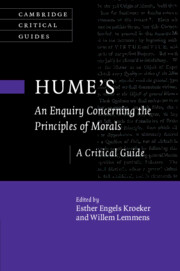Book contents
- Hume’s An Enquiry Concerning the Principles of Morals
- Cambridge Critical Guides
- Hume’s An Enquiry Concerning the Principles of Morals
- Copyright page
- Contents
- Contributors
- Acknowledgments
- Abbreviations
- Introduction
- Chapter 1 The Nature of Morals Founded on the Human Fabric
- Chapter 2 The Pride of Pericles
- Chapter 3 Justice and Politics in the Enquiry Concerning the Principles of Morals
- Chapter 4 History, Context, and the Conventions of Political Society
- Chapter 5 “Why Utility Pleases”
- Chapter 6 Hume on Talents and Moral Virtues
- Chapter 7 Virtues Suspect and Sublime
- Chapter 8 Sympathy and the Sources of Moral Sentiment
- Chapter 9 Virtue and Moral Psychology in the Enquiry Concerning the Principles of Morals
- Chapter 10 Hume, Cicero, and the Ancients
- Chapter 11 Hume on Religion in the Enquiry Concerning the Principles of Morals
- Chapter 12 Moral Disagreement
- Bibliography
- Index
- Cambridge Critical Guides
Chapter 11 - Hume on Religion in the Enquiry Concerning the Principles of Morals
Published online by Cambridge University Press: 08 January 2021
- Hume’s An Enquiry Concerning the Principles of Morals
- Cambridge Critical Guides
- Hume’s An Enquiry Concerning the Principles of Morals
- Copyright page
- Contents
- Contributors
- Acknowledgments
- Abbreviations
- Introduction
- Chapter 1 The Nature of Morals Founded on the Human Fabric
- Chapter 2 The Pride of Pericles
- Chapter 3 Justice and Politics in the Enquiry Concerning the Principles of Morals
- Chapter 4 History, Context, and the Conventions of Political Society
- Chapter 5 “Why Utility Pleases”
- Chapter 6 Hume on Talents and Moral Virtues
- Chapter 7 Virtues Suspect and Sublime
- Chapter 8 Sympathy and the Sources of Moral Sentiment
- Chapter 9 Virtue and Moral Psychology in the Enquiry Concerning the Principles of Morals
- Chapter 10 Hume, Cicero, and the Ancients
- Chapter 11 Hume on Religion in the Enquiry Concerning the Principles of Morals
- Chapter 12 Moral Disagreement
- Bibliography
- Index
- Cambridge Critical Guides
Summary
In this chapter I argue that despite Hume’s explicit criticisms of enthusiasm and superstition in the Enquiry Concerning the Principles of Morals (EPM), his more important targets are the orthodox and moderate Protestants of his time who would also scorn enthusiasm and superstition, and those philosophers who mixed Protestant accounts of virtue and duty with their philosophy. I show that Hume rejects central aspects of two prominent Protestant texts, The Whole Duty of Man and the Westminster Confession of Faith, but also borrows some of their language and mimics their style. Hume rejects The Whole Duty of Man’s catalog of duties limited to voluntary traits, and the Confession’s account of the sole purpose of man as well as its view of human nature. Still, in EPM Hume seems to use the style and language of these texts in order to be equally influential, to push religion back into the temple (and out of the public space), and to bring his moral philosophy out of the closet into common life in order to give it more extensive recognition as the accurate description of virtue and vice. EPM, therefore, is Hume’s own secular but religiously styled credo on duty and virtue.
Keywords
- Type
- Chapter
- Information
- Hume's An Enquiry Concerning the Principles of MoralsA Critical Guide, pp. 219 - 237Publisher: Cambridge University PressPrint publication year: 2021
- 2
- Cited by

